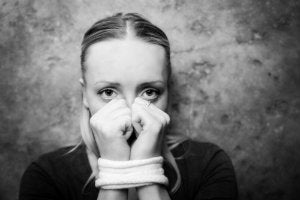Why Do We Blame Victims?
Victims suggest innocence. And innocence, by the inexorable logic that governs all relational terms, suggests guilt. - Susan Sontag
 Whether it’s rape, cancer, bullying or a bear attack, humans have an unflattering first response. They analyze the victim and the circumstances that led to their misfortune. Rape: Was she out alone at the bar at night? Cancer: Did she make poor lifestyle choices? Bullying: Why is he so sensitive? Bear: Was he hiking alone without bear spray?
Whether it’s rape, cancer, bullying or a bear attack, humans have an unflattering first response. They analyze the victim and the circumstances that led to their misfortune. Rape: Was she out alone at the bar at night? Cancer: Did she make poor lifestyle choices? Bullying: Why is he so sensitive? Bear: Was he hiking alone without bear spray?
The reason we do this is actually all too easy to understand as explained by this Psychology Today Article: “Victim blaming is not just about avoiding culpability—it's also about avoiding vulnerability. The more innocent a victim, the more threatening they are. Victims threaten our sense that the world is a safe and moral place, where good things happen to good people and bad things happen to bad people. When bad things happen to good people, it implies that no one is safe, that no matter how good we are, we too could be vulnerable.”
This phenomenon, called the “just world phenomenon” has been proven in studies, the most famous study was done by social psychologist Dr. Melvin Lerner in the 60s. He found that when people could not help someone receiving electric shock, their response was disturbing. They belittled the victim.
And it’s not just seen with electric shock, but also victims of car accidents, rape, domestic violence, illness, and poverty. Worse still, it turns out the victims themselves are also victims of this mentality. They actually begin to blame themselves to try and link their misfortune to their own behavior. Some speculate this helps them feel more in control of the situation and their uncertain future.
But our personal terror about the chaotic nature of life is no excuse for detestable behavior toward people and families already suffering from the random cruelty life doles out. So, what can be done?
The First Step . . . recognize that we all do this and it’s a natural human reaction to tragedy. Natural? Yes. Excusable? NO. Recognizing this behavior in yourself is as difficult as it is uncomfortable. Often victim blaming is very subtle.
Example: Asking a cancer victim if they eat gluten free, meditate or have tried alternative treatment X or Y is a subtle form of victim blaming. Recognize your own need to feel in control of your body in this situation. Your belief, or even your file full of research about the healing power of natural medicines and therapies, is not a relate-able comfort to someone suffering. In fact, autobiographical experiences, in general, are a poor way to relate to a person who is suffering. There are better ways to relate and empathize.
The Next Step… acknowledge that this circumstance could happen to the most well intentioned, prepared and vigilant person. INCLUDING YOU. Yep. You could be raped. You could get cancer. You could be assaulted by a bully or attacked by an animal. Go ahead. Go down that very frightening road in your mind. Make plan after plan of how you’ll stop this from happening or manage it after it does. But also, realize, it CAN happen to you. Come face to face with the harsh realities of randomness and injustice.
Finally… take heart. We might all, at some point, become victims to life’s cruelties. In fact, it’s likely. So where do you find comfort in this? We find comfort in one another. In kindness, love and shared experiences. In other words, the solution to this shared and awful problem of random suffering is to embrace the reality and rely on and help one another. The solution is the OPPOSITE of our tendency to blame the victim.
Fred Roger’s famous quote, a re-quote from his own mother, says it best: “When I was a boy and I would see scary things in the news, my mother would say to me, 'Look for the helpers. You will always find people who are helping."
When you encounter a victim, be a helper. Don’t let your fears make you a blamer.






Human Unlimited
Author